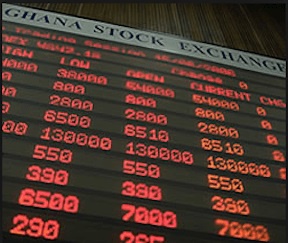The significant rise in trading volumes on the Ghana Fixed Income Market since the beginning of this year has continued unabated, despite the dire impact of the coronavirus pandemic on most aspects of economic activity in Ghana.
Indeed, the performance of the GFIM with regards to trading volumes since the beginning of this year defies the most common argument used to explain the continued poor performance of equities listed on the Ghana Stock Exchange – that investors are responding to illiquidity brought about by the recent financial services industry melt down which has cost them considerable amounts of investible funds.
First, there is the problem of ongoing price performance. This is the third consecutive year of falling share prices, which means investors are presented with the prospect of capital losses, rather than capital gains.
However, investors should recognize the fact that the continued fall in share prices has pushed the price-earnings ratios of most listed companies to long term lows and this means that sooner or later their share prices will have to rise and considerably too.
The same herd instinct of investors that is pushing share prices down will eventually push them upwards and those that will benefit the most are those who buy in just before the turnaround.
Then there is the fear of foreign exchange losses arising from cedi depreciation, a situation-specific to foreign investors. While the cedi has been far more stable since mid-2015 than it had been in previous years, the danger is still there evidenced by occasional steep depreciation..
It is therefore necessary to wean the equities market off its heavy reliance on foreign institutional investors. Over the past decade institutional investment funds have flourished in Ghana, ranging from collective investment schemes and other managed investment portfolios, through private pension funds, to life insurance funds.
There is an urgent need to devise fiscal policies that encourage them to invest prudently in equities and back this up with aggressive marketing by the GSE itself and stockbroking firms who stand to gain directly from increased trading volumes in a rising market.
Next is the uncertainty surrounding the financial prospects of listed companies. Unfortunately, those uncertainties have peaked with the advent of COVID 19 which is taking a heavy toll on business activities which can be expected to reflect in the financial performance of listed firms. This is one problem that cannot be fixed by policy.
The last problem is that of fixed income investment alternatives. Even the lowered price-earnings ratios of listed equities do not provide an overly enticing risk premium on fixed income securities that offer over 20 percent for the longest-tenured ones and which have been made liquid by the vibrant trading on GFIM.
The situation could have been even worse if government had not decided to fall back on the Bank of Ghana to finance its extraordinary fiscal deficit for 2020 forced upon it by COVID-19.
Indeed, listed companies seeking new finance would be better off offering corporate bonds than doing new share offers.
All this means that companies listed on the GSE still have rough times ahead. But this is an opportunity too; as equities become more and more underpriced, investors will get more upward price appreciation potential. As for the listed companies themselves they will just have to be patient and ride out this prolonged financial storm,.
Click to view details



Business News of Monday, 1 June 2020
Source: goldstreetbusiness.com
Coronavirus: The predicament of listed equities
 File photo
File photo
















